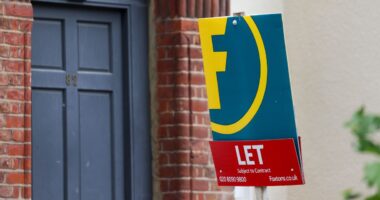
Senate Majority Leader Mitch McConnell has sought a liability shield for businesses operating during the pandemic.
Photo: Shawn Thew/EPA/Shutterstock
WASHINGTON—A flurry of competing proposals for another coronavirus relief package ricocheted around the Capitol Wednesday, as lawmakers hunted for ways to resolve a thorny debate over liability protections that has stymied progress for weeks.
A bipartisan group was still working late Wednesday to craft an agreement over some form of legal protections for businesses, schools and other entities operating during the pandemic, the single most stubborn roadblock for lawmakers eager to reach a deal on emergency relief. While lawmakers broadly agree with the White House that a new aid package is needed—and even on its rough price tag of just over $900 billion—compromise on the liability provision has long remained elusive.
Even once a $908 billion proposal from a bipartisan group of Senate and House lawmakers has been finalized, Republican leaders signaled more work would likely be needed on any agreement that could be added to the omnibus, the full-year spending bill lawmakers are scrambling to finish before the end of next week. The government’s current funding expires at 12:01 a.m. Saturday, but the House passed Wednesday a one-week extension expected to be approved in the Senate later in the week.
“They’ve come up with some ideas, and I think many things they’ve talked about could be put in the omnibus,” Sen. John Cornyn (R., Texas), a top ally of GOP leadership, said of the bipartisan group. “The fact is we’re not going to have a stand-alone Covid-19 bill. It will be part of the omnibus, if it is there at all,” he said.
Sen. Angus King (I., Maine) and Sen. Lindsey Graham (R., S.C.), the chairman of the Senate Judiciary Committee, have been working on a new approach to the liability issue. Mr. King has proposed that Congress create an affirmative defense for Covid-19-related lawsuits, lawmakers said. With an affirmative defense, defendants in cases involving people exposed to coronavirus may not be held liable if the defendant can prove certain conditions.
Mr. King said Wednesday that he was finalizing the language of his proposal, but had not released it by Wednesday night. A Republican aide said that creating an affirmative defense has no chance of winning approval from GOP leadership.
Lawmakers have also been working for weeks to finalize a formula for how to distribute funding for state and local governments, a priority of Democrats, and said they were close Wednesday to resolving that.
Covid-19 Aid Negotiations
In a surprise twist this week, Senate Majority Leader Mitch McConnell (R., Ky.), who had insisted for months on including a liability provision in any relief package, suggested Tuesday that lawmakers could proceed by dropping both contentious issues. But just hours later, the White House presented its own offer to House Speaker Nancy Pelosi (D., Calif.) that included both state and local funding, as well as liability protections.
Unlike the bipartisan proposal, the White House offer included sending direct checks of $600 in aid per person to many Americans, but omitted the $300 a week in enhanced unemployment insurance that the bipartisan group had proposed.
The Trump administration’s offer would instead extend existing jobless programs, in addition to $160 billion for state and local governments, $320 billion for small businesses, and $16 billion for vaccine distribution, among other measures.
While many Democrats want to send out a second round of direct checks, they objected to including them at the expense of enhanced unemployment insurance.
“How can anybody say, ‘I’m going to send another check to people that already have a paycheck and a job’ and not send anything to the unemployed?” Sen. Joe Manchin (D., W.Va.), a member of the bipartisan group, said Wednesday. But Mr. Manchin said it was promising that the White House’s $916 billion offer was “in the same ballpark” funding level as his group’s proposal.
Some Republicans, including President Trump, support the direct checks, but others have concerns.
“Most of our members would rather have an extension of the plussed-up [unemployment insurance] benefit rather than having those checks because at least those are going to people who don’t have jobs,” Senate Majority Whip John Thune (R., S.D.) said Wednesday. “And right now they really need help.”
Treasury Secretary Steven Mnuchin on Wednesday defended the administration’s decision to add direct checks and drop the extra weekly benefit payments. Stimulus checks could be deposited directly in most recipients’ bank accounts before Christmas, he said, while it may take much longer for states to make the changes necessary to begin sending extra payments.
“We viewed this as a more effective way of getting money out quickly,” he said.
Mr. Mnuchin acknowledged that state and local aid and liability protections remained sticking points. If negotiators can’t resolve those two issues, he said, Congress should move forward with an agreement on everything else.
“I’m cautiously hopeful we can get something over the finish line,” he said.
Mr. McConnell on Wednesday criticized Mrs. Pelosi and Senate Minority Leader Chuck Schumer (D., N.Y.) for rebuffing both his proposal and that of the administration.
“Two more brush-offs in about two hours. More deflection, more delay, and more suffering for innocent Americans,” Mr. McConnell said Wednesday on the Senate floor. “We can’t do a thing unless the Democrats decide they want to make law.”
Mr. Schumer said he and Mrs. Pelosi wanted to let bipartisan talks continue and that they were encouraged that the White House proposal was of a similar size.
“It would do a whole lot of good if the Republican leader would drop the daily tirades, and diatribes, which seem to be based in some alternate reality, and join the rest of the Senate in urging the bipartisan negotiations now under way to continue,” Mr. Schumer said on the Senate floor.
The bipartisan group continued to flesh out its proposal, completing a detailed summary Wednesday that filled in details on all but the two most contentious issues. Their four-month proposal would include $300 a week in unemployment insurance for 16 weeks, $300 billion in relief for small businesses, $35 billion for health-care providers, $82 billion for schools, a 15% increase in monthly food-stamp benefits, $10 billion for child-care providers, $25 billion for rental assistance and a moratorium on evictions through the end of January 2021, according to the summary.
Lawmakers in the bipartisan group have been meeting multiple times a day over Zoom to continue to iron out the state and local funding distribution formula, as well as how to structure the liability component.
According to a litigation database maintained by law firm Hunton Andrews Kurth LLP, more than 6,500 coronavirus-related lawsuits have been filed across the country. Of those, 23 deal with consumers allegedly exposed to the virus, 158 emerge from health-care settings and 116 respond to employment conditions, according to the database. Other cases involve unlawful termination claims, contract disputes, eviction issues and civil-rights claims.
—Kate Davidson contributed to this article.
Write to Kristina Peterson at [email protected] and Andrew Duehren at [email protected]
Copyright ©2020 Dow Jones & Company, Inc. All Rights Reserved. 87990cbe856818d5eddac44c7b1cdeb8
Appeared in the December 10, 2020, print edition as ‘Lawmakers Wrangle Over Aid Proposals.’









